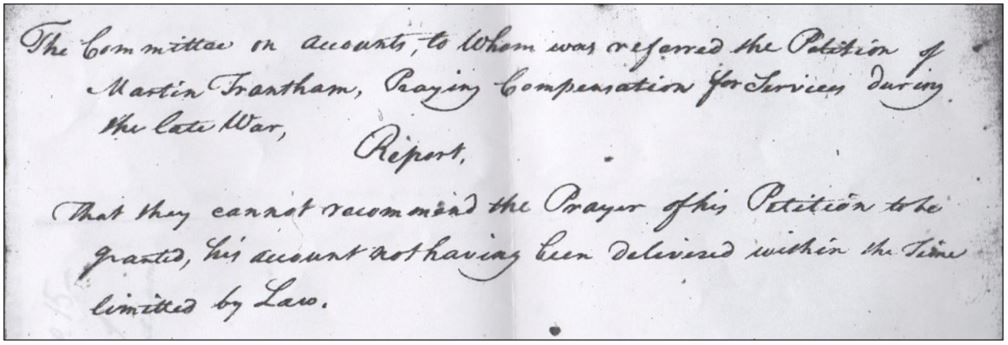Bad news awaited Martin Trantham, my 5th great grandfather, when he returned home after his brief sojourn into the Spanish-controlled Natchez District: he had missed the deadline to be compensated for serving in the Revolutionary War. Ouch. Compensation at the time came in the form of land grants since the fledgling former colonies had very few pesos in the coffers. Fight for your country and if we win we’ll give you land (we don’t own). If we lose, you should have fought harder. That was the arrangement.
So, poor Martin, who had missed the deadline, filed a petition with the land-granting authorities in South Carolina in hopes that an exception could be made. Nope. They turned him down on November 17, 1795 on the grounds that his request was “not delivered within the time limited by law.” That must have sucked like a black hole trapped within a bigger and blacker black hole.
Martin’s disappointment was not a singular event. The newly-formed government must have realized that many soldiers had missed the same deadline. So the laws were changed and the former colonies began compensating the former soldiers again – some grants happened as late as 1841. That would explain the land survey order that was (finally) ordered on behalf of Martin Trantham in 1824 – almost thirty years after his petition was turned down. Since Martin had been a private, 640 acres was his bounty. North Carolina – where the survey was ordered – had run out of land by this time so it was granting land in its former western region – Tennessee. That would explain why the original survey order is housed in the Tennessee State Library and Archives in Nashville.
Now, should other Trantham researchers happen upon this blog, how can I be so certain that this Martin Trantham fought in the Revolutionary War and not his father, Martin Trantham, Jr. or some other Martin Trantham? First, his great grandson, Lewis Peach, told us so in his 1884 letter concerning Betsy Trantham’s “real” age. Second, our dear Betsy was the head of her household in 1820 so it wasn’t Martin Trantham, Jr. her husband – he was DEAD in 1824. And it wasn’t his father Martin Trantham, Sr. of the 1783 will (also DEAD) or his half-brother also named Martin Trantham who was a minor in the 1783 will – unless he fought in diapers, it wasn’t him either. Touché.
Kenfolk: Tranthams
Relation: 5th great grandfather
Common ancestors: Martin Trantham was the son of Martin Trantham, Jr. and Elizabeth (Martinleer Eppinger) Trantham, my 6th great grandparents
References:
Ancestry.com. North Carolina and Tennessee, Revolutionary War Land Warrants, 1783-1843 [database on-line]. Provo, UT, USA: Ancestry.com Operations, Inc., 2013.
Ancestry.com. Revolutionary War Bounty Land Grants [database on-line]. Provo, UT, USA: Ancestry.com Operations Inc, 2006.
Lewis Peach’s letter was reprinted in:
Knight, J. K. (1980). Obituaries from Tennessee Newspapers 1851-1899. Easley, South Carolina: Southern Historical Press, Inc.
